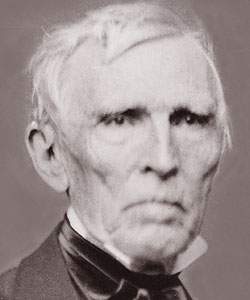John Jordan Crittenden (American National Biography)
Scholarship
Elected to the Senate again in 1854, Crittenden strove against the resurgence of the slavery issue brought about by the Kansas-Nebraska Act. Assuming the role of the deceased Clay, Crittenden attempted to alleviate sectional tension with conciliation. He spoke thoughtfully and eloquently on the need for compromise and an end to the growing stridency of his fellow senators. He helped found the Constitutional Union party that nominated John Bell for president in 1860.
In December 1860, one month after Abraham Lincoln's election, Crittenden introduced his "Crittenden Compromise" proposal to restore and extend the Missouri Compromise line to the Pacific Ocean. Its terms included that slavery would be protected south, and prohibited north of the 36° 30' line; new states could exercise popular sovereignty; and Congress would be prohibited from either abolishing slavery in the District of Columbia or regulating the interstate transport of slaves. The proposal was rejected, seven to six, by a special "Committee of Thirteen," a group of senators appointed to consider it. Ironically, its defeat was secured by a coalition of southerners and antislavery Republicans.
Crittenden left the Senate and returned to Kentucky in 1861, arguing successfully for his state not to join the secessionist movement and participating in a border-state convention seeking compromise. Reflective of the times, of Crittenden's sons who joined the war, two attained the rank of major general: George Bibb Crittenden for the Confederacy, Thomas Leonidas Crittenden for the Union.
In December 1860, one month after Abraham Lincoln's election, Crittenden introduced his "Crittenden Compromise" proposal to restore and extend the Missouri Compromise line to the Pacific Ocean. Its terms included that slavery would be protected south, and prohibited north of the 36° 30' line; new states could exercise popular sovereignty; and Congress would be prohibited from either abolishing slavery in the District of Columbia or regulating the interstate transport of slaves. The proposal was rejected, seven to six, by a special "Committee of Thirteen," a group of senators appointed to consider it. Ironically, its defeat was secured by a coalition of southerners and antislavery Republicans.
Crittenden left the Senate and returned to Kentucky in 1861, arguing successfully for his state not to join the secessionist movement and participating in a border-state convention seeking compromise. Reflective of the times, of Crittenden's sons who joined the war, two attained the rank of major general: George Bibb Crittenden for the Confederacy, Thomas Leonidas Crittenden for the Union.
Thomas E. Stephens, "Crittenden, John Jordan," American National Biography Online, February 2000, http://www.anb.org/articles/03/03-00117.html.
John Jordan Crittenden (Congressional Biographical Directory)
Reference
CRITTENDEN, John Jordan, (uncle of Thomas Theodore Crittenden), a Senator and a Representative from Kentucky; born near Versailles, Woodford County, Ky., September 10, 1786; completed preparatory studies; attended Pisgah Academy, Woodford County, Ky., Washington College (now Washington and Lee University), Lexington, Va., and graduated from William and Mary College, Williamsburg, Va., in 1806; studied law; admitted to the bar and commenced practice in Woodford County, Ky., in 1807; attorney general of Illinois Territory 1809-1810; served in the War of 1812 as aide to the Governor; resumed the practice of law in Russellville, Ky.; member, State house of representatives 1811-1817, and served as speaker the last term; elected as a Democratic Republican to the United States Senate and served from March 4, 1817, to March 3, 1819, when he resigned; chairman, Committee on Judiciary (Fifteenth Congress); moved to Frankfort, Ky., in 1819; member, State house of representatives 1825, 1829-1832; appointed and was confirmed as United States district attorney in 1827, but was removed by President Andrew Jackson in 1829; nominated in 1828 by President John Quincy Adams as an Associate Justice of the Supreme Court of the United States, but was not confirmed by the Senate; again elected to the United States Senate as a Whig and served from March 4, 1835, to March 3, 1841; appointed Attorney General of the United States by President William Henry Harrison March to September 1841; appointed and subsequently elected as a Whig to the United States Senate to fill the vacancy caused by the resignation of Henry Clay and served from March 31, 1842, to June 12, 1848, when he resigned; chairman, Committee on Military Affairs (Twenty-seventh and Twenty-eighth Congresses); Governor of Kentucky 1848-1850, when he resigned; again appointed Attorney General by President Millard Fillmore 1850-1853; again elected to the United States Senate as a Whig (later American/Know-Nothing) and served from March 4, 1855, to March 3, 1861; chairman, Committee on Revolutionary Claims (Thirty-sixth Congress); elected as a Unionist to the Thirty-seventh Congress (March 4, 1861-March 3, 1863); was a candidate for reelection at the time of his death; died in Frankfort, Ky., July 26, 1863; interment in State Cemetery, Frankfort, Ky.
“Crittenden, John Jordan,” Biographical Directory of the United States Congress, 1774 to Present, http://bioguide.congress.gov/scripts/biodisplay.pl?index=c000912.



